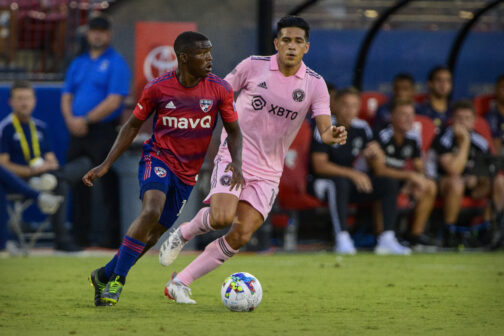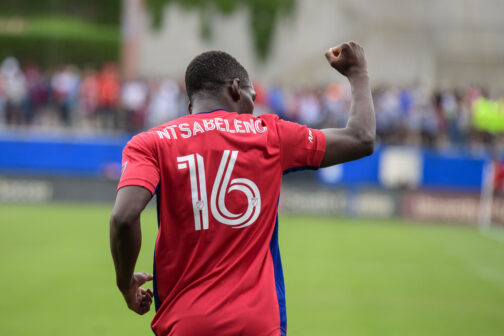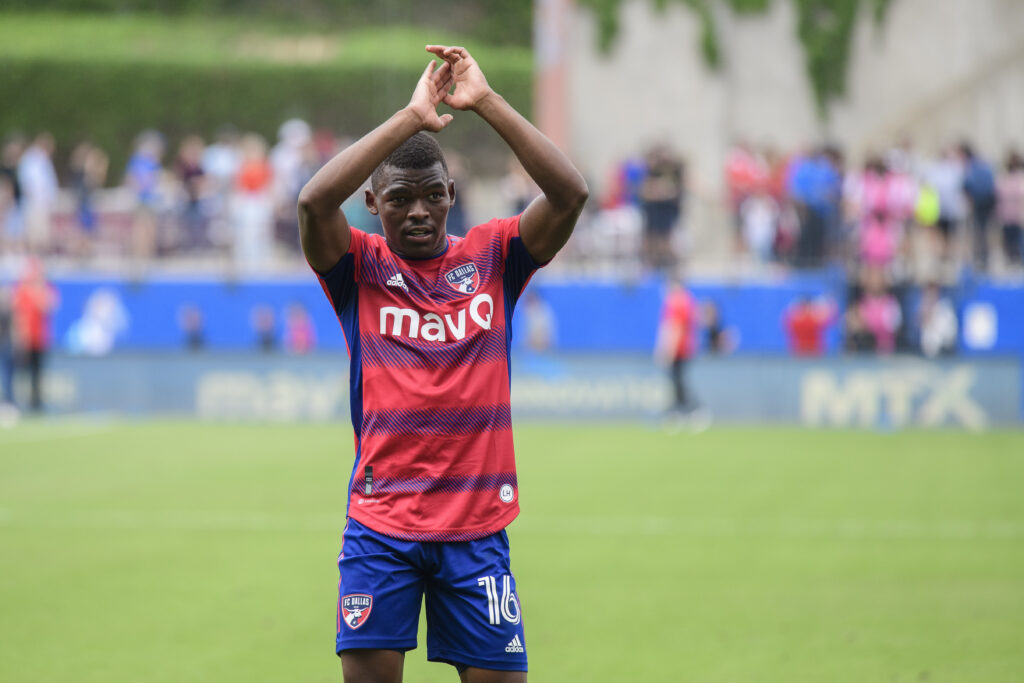Oregon State men’s soccer coach Terry Boss likes to get an early start, 5 a.m., before the sun has risen and before most of his players have rolled out of bed. Which is why a particular morning in the fall of 2020 still stands out in his mind.
Boss was in the weight room, about to start a workout, when he took a glance out a window overlooking the soccer field. Normally, it was quiet, empty. This time, he saw a blur of action. Balls were scattered about the pitch. A single player was running alone in the dark.
His name was Katlego “Tsiki” Ntsabeleng, a South African who had recently transferred in from Coastal Carolina. Boss had admired Ntsabeleng’s talent since before he had arrived in Corvallis. But with Ntsabeleng having only been on campus for a few months, Boss was still getting to know the person. That glimpse told him a lot.
“In that moment, I remember thinking, ‘He’s going to make it,’” Boss says. “He has enough quality, and not many people also have the work ethic.”
That hasn’t been the dominant opinion for much of Ntsabeleng’s soccer career. At various points in his journey to FC Dallas, he teetered on the edge between soccer and a different career path. But he continued to press on, to bet on himself. Now the midfielder is FC Dallas’ most impactful rookie.
Ntsabeleng’s father, River, introduced him to the game in the township streets outside Johannesburg, where the best prospects quickly learn how to keep the ball at their feet because a pass across the rough terrain is never guaranteed. River worked for a wholesaler; while the family never wanted for food or shelter, it was not a luxurious childhood. Soccer became Katlego’s passion. He learned how to rely on his shiftiness and speed to beat defenders, cobbling together a style that earned him the nickname “Tsiki” after a local player who played similarly.
At age 15, he was discovered by the Stars of Africa Football Academy in Johannesburg, a breeding ground for South African national teamers. But while his reputation grew locally, his small stature—5 foot 6 and under 160 pounds—hadn’t attracted the attention of pro scouts three years later. He didn’t want to stop playing, so he needed a backup plan. He decided to attend the University of Johannesburg and work on a degree in sports management.
All the while, he kept playing for the youth national team. That’s where he eventually caught the attention of Kyle Timm, who was an assistant coach at Coastal Carolina University in South Carolina from 2017 to 2019. Timm took a similar path, being recruited from South Africa to play for Tyler Junior College. He knows the market well and watches high-level youth games in the country, bringing over numerous college players from his home country during his coaching career. Over the years, Timm has stayed in touch with Ntsabeleng, checking in at each step along his career. He saw a textbook South African talent he believed had what it took to make it in the United States. “They have this quickness, this ability to get out of tight spaces, and creativity that the average college player doesn’t have,” Timm says. That was enough to offer him a scholarship to Coastal Carolina.

Ntsabeleng found himself on the edge of a big decision. He could stay in school and hope to catch on with a local team after graduation. Or he could take his chances in the United States, 8,000 miles from home.
Ntsabeleng chose adventure. He convinced his parents to let him head to the States because it would allow him to finish his studies while following his passion.
He flew to the States two days before preseason and touched down in Conway, South Carolina, a world far different from any he’d known. He remembers struggling to understand people’s accents in the Atlanta airport. Even more than that, he remembers sweltering humidity. “I almost couldn’t finish the first practice,” he says.
On the field, the biggest adjustment was the physicality of the game. He imagined success would come easy, but he hadn’t encountered the bigger, stronger players that populate American college soccer. His initial confidence evaporated quickly.
But he persisted. Just like he would three years later in Corvallis, Ntsabeleng put in the work to adjust to a new life and a new team. He would stay up late into the night so that he could call River back in South Africa to review film and talk soccer.
The work paid off. He was named 2018 Sun Belt Newcomer of the Year and first-team all-conference in 2018 and 2019. But when Timm moved on to a new position, Ntsabeleng lost the person who’d brought him to Conway to begin with. He entered the NCAA transfer portal, with an eye on challenging himself at a stronger conference. From there, he was put in touch with Boss at Oregon State, where a few South African players were already on the Beavers roster.
Boss and Oregon State had played against Ntsabeleng while he was at Coastal and was aware of his quality, especially his ability to unbalance defenders with his movement, a technical quality that many college players lack. Boss admired how Ntsabeleng could find ways to wriggle away from defenders when it looked like there was no hope. So when the Beavers saw Ntsabeleng’s name in the portal, they made sure to reach out. And, for his part, Ntsabeleng liked what he heard—even if Oregon State couldn’t guarantee him a starting position.
No matter. Ntsabeleng graduated from Coastal and enrolled at graduate school in Corvallis to study sports and fitness administration. He was on the edge of the first team, coming off the bench and adjusting to another climb in competition. He was frustrated. But like always, he kept working. “It speaks to who he is as a person and his ability to be uncomfortable, his ability not to get frustrated and not give up,” Boss says. “I knew he had the quality of the best players on this team, and, ultimately, we knew he would get there.”
By the end of the 2020 season, he was a consistent starter. The following season, in his last year of eligibility, he started every game and earned All-Pac-12 First Team and All-Far West Region First Team honors, scoring five goals and notching eight assists along the way.
Despite his collegiate success, he wasn’t invited to the MLS combine. The road before him diverged again, and he began to look at careers outside of soccer, considering a job in higher education on campus at Oregon State. But he heard through word of mouth that teams were asking about him, and Boss kept encouraging him to keep believing. He could hold in a bit longer.
He tuned in to the 2022 MLS Draft mostly to see where his teammate Sofiane Djeffal would land. After all, Djeffal was named Pac-12 Player of the Year and was a semifinalist for the Herman Trophy, the award for college soccer’s top player. If anyone from OSU was getting drafted, it was him.
Little did Ntsabeleng know he’d be getting a call from FC Dallas owners Dan and Clark Hunt a few picks before Djeffal went to DC United in the second round. They had just hired a new manager, Nico Estévez, whose background of coaching smaller, technically gifted players in his native Spain, as he puts it, ensures “we get out of the stereotypes.” So while other teams may have continued to question the South African’s physique, FC Dallas saw a player whose comfort on the ball, dynamic movement, and ability to get into the attack on the dribble or with his passing fit well into manager Estévez’s brand of soccer. So well, in fact, that the club traded up to get a third pick in this year’s first round just to make sure Ntsabeleng landed in Dallas.
“We were watching him when he was playing at Oregon State, and we saw that he was different from minute one,” Estévez says. “We right away thought of him as someone that can have immediate impact on the roster. Every game that he plays, he does good things.”
None of it made sense to Ntsabeleng. “I didn’t even want to watch the draft because I was too nervous and anxious, but when they called my name, I couldn’t believe it,” he says. The pick was so unexpected that Ntsabeleng’s parents hadn’t stayed up to watch. He couldn’t get them on the line until they woke up the next day.
Landing a contract as an international college player is no easy task in MLS. First, he must disprove the stereotype that follows every college player into the league: that he’s not just an elite athlete depending on his athleticism over his technique. As MLS and American youth soccer improve, the thinking is that the players who are going to be solid professionals don’t go to college, but sign professional contracts as teenagers. If a player ends up in college, they are assumed to be limited. In addition to overcoming the college stigma, he must prove worthy of the eight international slots each club has, which can be used on proven veterans.
But Ntsabeleng impressed enough to do just that. From there, he has done what he always has: claw his way into the conversation. Even though Ntsabeleng was FC Dallas’ third pick in this year’s crop, he was their first to make the game-day roster, play, score, and start a game. He did all of that in the first 10 matches, helping the team to fourth place in the Western Conference. Since then, Ntsabeleng has started eight matches, solidifying a starting spot this month.
He has approached his brief MLS career with the same attitude that has brought him this far: taking advantage of every moment, outworking the guy next to him, and loving every minute of it.

“He enjoys training, and you can see that he loves soccer,” Estévez says. “This is his best quality: when you see him, he’s loving it.”
Ntsabeleng’s soccer career has danced along a razor’s edge between moving on from soccer and leveling up his competition, from Johannesburg to Oregon and now in North Texas. In April, a match against rival Houston Dynamo hung in a similar balance between success and failure. FC Dallas was down 1-0 in the 87th minute when left back Marco Farfan made an overlapping run and received the ball on the left wing, firing a low, hard cross into the box.
Ntsabeleng floated through the defense, unmarked, as though his size and reputation made him a nonfactor to the defense. There are always bigger players to worry about, after all. By the time a Dynamo defender picked him up, it was too late. The cross bounced off the Dynamo goalkeeper’s hands and right into Ntsabeleng’s run, whereupon the 24-year-old slid in to score a crucial tying goal in a game Dallas would win 2-1.
On the game broadcast, the Telemundo announcer paused before saying who scored the goal. Perhaps it was to gather himself before attempting to pronounce Ntsabeleng’s surname (it’s en-sa-buh-leng, in case you were wondering). Perhaps it was to reacquaint himself with who No. 16 was in the first place, given that Ntsabeleng had made just a few appearances off the bench at that point. The payoff was what mattered. This moment, the announcer said, was about “the South African youngster being able to come through in a big way.”
But, like everywhere else on his journey, Ntsabeleng’s time in Dallas has come with challenges, too. Such as the sweaty Saturday night in Houston on July 9, when he was subbed out after just 26 minutes in the Texas Derby, a potentially devastating moment for a player fighting to build a professional career. Timm was there that night to watch his old student in action, and he probably wasn’t surprised four days later, when Ntsabeleng was back in the starting lineup, slicing through defenders and setting up numerous chances for his teammates. He’d be named man of the match that night in a losing effort, and Timm insists rebounds like that are no coincidence.
Because Timm knows Ntsabeleng well enough to expect that he’ll never to stay down for long. He works too hard, for one thing. But there’s also something more to it. “He’s got a little bit of amnesia,” Timm says. “He forgets any mistake and doesn’t show that he is affected.”
There will be more setbacks to come but milestones, too. Because by now, Tsiki Ntsabeleng knows a thing or two about getting past his hardships. He knows even more about remembering to stay the course.
Get the ItList Newsletter
Author






